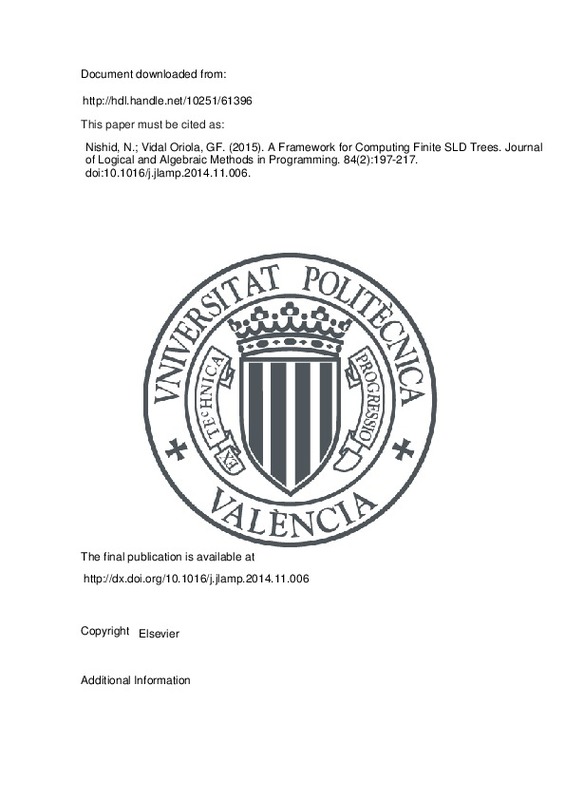JavaScript is disabled for your browser. Some features of this site may not work without it.
Buscar en RiuNet
Listar
Mi cuenta
Estadísticas
Ayuda RiuNet
Admin. UPV
A Framework for Computing Finite SLD Trees
Mostrar el registro sencillo del ítem
Ficheros en el ítem
| dc.contributor.author | Nishid, Naoki
|
es_ES |
| dc.contributor.author | Vidal Oriola, Germán Francisco
|
es_ES |
| dc.date.accessioned | 2016-03-03T10:28:30Z | |
| dc.date.available | 2016-03-03T10:28:30Z | |
| dc.date.issued | 2015-03 | |
| dc.identifier.issn | 2352-2208 | |
| dc.identifier.uri | http://hdl.handle.net/10251/61396 | |
| dc.description.abstract | The search space of SLD resolution, usually represented by means of a so-called SLD tree, is often infinite. However, there are many applications that must deal with possibly infinite SLD trees, like partial evaluation or some static analyses. In this context, being able to construct a finite representation of an infinite SLD tree becomes useful. In this work, we introduce a framework to construct a finite data structure representing the (possibly infinite) SLD derivations for a goal. This data structure, called closed SLD tree, is built using four basic operations: unfolding, flattening, splitting, and subsumption. We prove some basic properties for closed SLD trees, namely that both computed answers and calls are preserved. We present a couple of simple strategies for constructing closed SLD trees with different levels of abstraction, together with some examples of its application. Finally, we illustrate the viability of our approach by introducing a test case generator based on exploring closed SLD trees. | es_ES |
| dc.description.sponsorship | This work has been partially supported by the EU (FEDER) and the Spanish Ministerio de Economia y Competitividad (Secretaria de Estado de Investigacion, Desarrollo e Innovacion) under grant TIN2013-44742-C4-1-R and by the Generalitat Valenciana under grant PROMETEO/2011/052. | en_EN |
| dc.language | Inglés | es_ES |
| dc.publisher | Elsevier | es_ES |
| dc.relation.ispartof | Journal of Logical and Algebraic Methods in Programming | es_ES |
| dc.rights | Reserva de todos los derechos | es_ES |
| dc.subject | Logic programming | es_ES |
| dc.subject | Semantics | es_ES |
| dc.subject | Program analysis | es_ES |
| dc.subject.classification | LENGUAJES Y SISTEMAS INFORMATICOS | es_ES |
| dc.title | A Framework for Computing Finite SLD Trees | es_ES |
| dc.type | Artículo | es_ES |
| dc.identifier.doi | 10.1016/j.jlamp.2014.11.006 | |
| dc.relation.projectID | info:eu-repo/grantAgreement/MINECO//TIN2013-44742-C4-1-R/ES/VALIDACION ASISTIDA DE PROGRAMAS MEDIANTE METODOS PRECISOS Y RIGUROSOS PARA UNA INGENIERIA DEL SOFTWARE ROBUSTA/ | es_ES |
| dc.relation.projectID | info:eu-repo/grantAgreement/GVA//PROMETEO%2F2011%2F052/ES/LOGICEXTREME: TECNOLOGIA LOGICA Y SOFTWARE SEGURO/ | es_ES |
| dc.rights.accessRights | Abierto | es_ES |
| dc.contributor.affiliation | Universitat Politècnica de València. Departamento de Sistemas Informáticos y Computación - Departament de Sistemes Informàtics i Computació | es_ES |
| dc.description.bibliographicCitation | Nishid, N.; Vidal Oriola, GF. (2015). A Framework for Computing Finite SLD Trees. Journal of Logical and Algebraic Methods in Programming. 84(2):197-217. https://doi.org/10.1016/j.jlamp.2014.11.006 | es_ES |
| dc.description.accrualMethod | S | es_ES |
| dc.relation.publisherversion | http://dx.doi.org/10.1016/j.jlamp.2014.11.006 | es_ES |
| dc.description.upvformatpinicio | 197 | es_ES |
| dc.description.upvformatpfin | 217 | es_ES |
| dc.type.version | info:eu-repo/semantics/publishedVersion | es_ES |
| dc.description.volume | 84 | es_ES |
| dc.description.issue | 2 | es_ES |
| dc.relation.senia | 301923 | es_ES |
| dc.contributor.funder | Ministerio de Economía y Competitividad | es_ES |
| dc.contributor.funder | Generalitat Valenciana | es_ES |







![[Cerrado]](/themes/UPV/images/candado.png)

